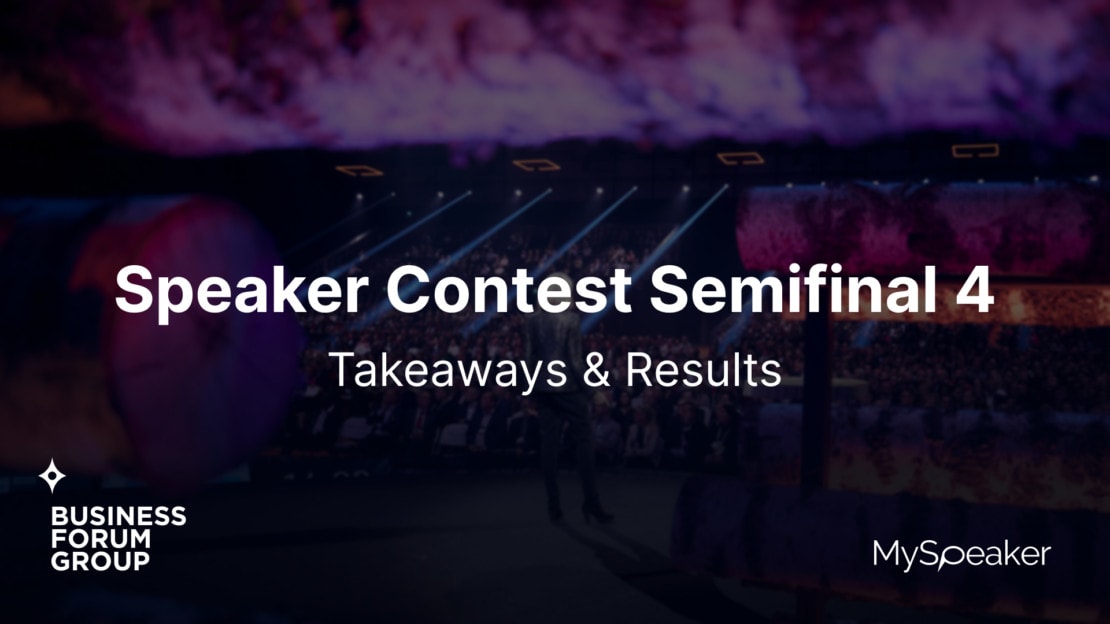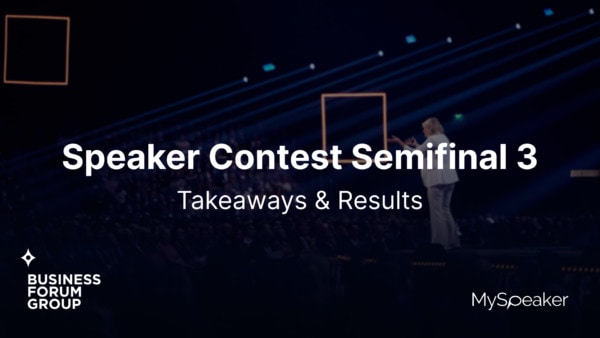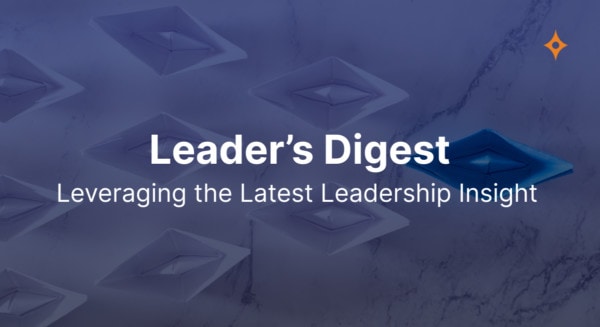17Mar2023
The 2023 Nordic Business Forum Speaker Contest semifinals are now done, and what a journey it has been for us and our semifinalists. We have heard inspiring stories and gained great insights into leadership, innovation, and sustainability.
Here are the summaries from the speakers of our last semifinal, which was held yesterday on the 16th of March.
Robyn Bolton – Your Success is Killing Innovation (Here’s How to Fix That)
In her speech, Robyn encourages leaders to go against their instinct. When making big decisions, the common instinct is to avoid risks. Usually this is done by looking at the best possible data. But what is the best data? Test markets can be unreliable, but simulations aren’t always 100% accurate either. If the creators of Swiffer hadn’t taken a risk and went ahead with their product launch even though the simulation data looked terrible, Swiffer wouldn’t be he billion dollar company it is today.
It’s understandable that leaders are looking for certainty. But the data we have is about the past, and “relying on data about the past to make decision about the future is like driving only looking in the rearview mirror,” says Robyn. “If you only look in the rearview mirror you are going to drive off a cliff”.
Only looking at past data will kill innovation. Innovation is not a problem to be solved, it’s a journey – almost like a roadtrip, as Robyn puts it. Every journey has twists and turns, unexpected things will happen, it will cost more than you want, but you will learn priceless lessons and have a greater advantage than those who won’t go on the journey. Next Robyn gave us the packing list for going on the innovation journey.
What you need for your innovation journey:
A destination – You can’t reach a destination, if you don’t know where it is.
A map – You need something to guide you. Your map is your strategy, and show syou where you are, where you want to go, and how to get there.
A driver’s license – Your license is your innovation behaviours; how you act and interact with the people around you.
A playlist – A banging playlist is an essential on any roadtrip – it sets the vibe. Your playlist is your culture, it sets the expectations for what is rewarded and what is valued on this journey.
“Innovation is not an idea problem, its a leadership problem,” says Robyn. The patron saint of innovation leadership is George Costanza, she says, a character from Seinfield. In one episode George finds himself fired, dumped, and living at home. He has a realisation – his own actions have brought him here. He decides to go against his instincts and do the complete opposite from now on. By not following his instinct, George finds himself dating a new girlfriend, working his dream job, and living in his own apartment.
As a leader, you should do like George. Go against your instinct. When leading a project, don’t ask the usual innovation killing questions, like “Can we do it?” Instead of “Can we,” ask “Should we do it?” Are we solving a problem, are we offering a solution people care about? Instead of “How quickly can we get to market?” ask “How quickly can we learn?” When you focus on learning, your failure will be small and cheap.
Embrace your inner George and do the opposite of your instinct, look in front and not just in the rearview mirror – unless you want to kill innovation.
Peter Hoogland – Navigating The Age of Blue Tornadoes
We are living in times that are full of unexpected twists and turns. It is the age of blue tornadoes, as Peter put it in his speech. A black storm is something that is visible, you can clearly see the signs of it approaching – and it is up to you if you prepare for it or decide to look away.
Unlike black storms, tornadoes are unpredictable. There is uncertainty to it. We might know something is coming, but we don’t know when or how it will happen, or how big the impact will be.
“Life without predictability feels like purgatory” says Peter. We wan’t to know what what will happen next. Not knowing what to expect or how to prepare for it causes anxiety. Our brain works best with patterns and logic, and when these patterns are lost, our perceptions becomes clouded and we become driven by fear.
How should be navigate this era of tornadoes?
Peter suggests using what he calls the “five mental fundamentals”
Rhizomatic thinking – “Rhizomatic refers to plants with horizontally expanding branches,” explains Peter. “Rhizomatic thinking embraces fluid structures”, which give room for growing, learning, and expanding.
Cathedral thinking – Like the people who design and build cathedrals, we should focus on projects that exceed our own life span. When we think of solutions for issues like climate change, we have to look further than our own lifetime.
Sensory scenario experiences – This third mental fundamental refers to scenario thinking with an emotional dimension. “By translating a rational giving into an emotional experience, wisdom unfolds”. This type of exploration also helps us to find our blind spots. “Knowledge is power, wisdom is powerful.”
Sustainability – “Sustainability starts by creating harmony and emotional connection,” says Peter in explaining his fourth point. To him it seems that companies sustainability strategies are merely designed to achieving practical goals. Peter believes we need to take into account what nature and people need, and that the basis of real sustainability is emotional connection.
Psychological innovation – Understanding our unconscious minds we can overcome mental blocks, eliminate fear of failure, connect better with others, and learn to make better choices.
These are the five mental fundamentals Peter taught us, which he believes are the key to navigating the current and upcoming times of uncertainty.
Harald Kjellin- Will artificial intelligence destroy us or make us smarter
Many people have fears about Artificial Intelligence. Will it steal our jobs? Is it a threat to humanity? Will AI take over in the future and enslave our species? And it’s not just paranoid people who have these worries, it’s celebrities and people from all walks of life. Should we be worried? Should we do something?
This is the topic Harald addressed in his keynote; is AI something to be worried about, and what should we do about it? In Harald’s opinion we should develop AI that is completely decentralized. This is the best way to go about developing AI, because “democracy beats dictatorship,” he says.
Harald is no novice when it comes to AI, he has been studying and discussing AI with other experts for over 30 years. “The knowledge that drives AI must be visible. If we have a knowledge driving system, human beings need to understand this knowledge.” AI can do so many things; it can diagnose diseases, write songs, make art – but these skills are narrow. AI cannot reflect on it’s own knowledge, therefore, it is just as dumb as it is smart.
“The knowledge is in a big black box and no one can see it”. If we don’t know how the intelligence works, it is difficult to trust it – this may just be the source of all those fears discussed in the beginning. We should be able to ask AI how it came to a conclusion. It should be able to justify us that the information it produces is correct, and be able to convince us of it’s opinions. We must be able to trust AI, and AI should trust us. Otherwise there is no dynamic and no relationship.
“All living systems in the world learn in the same way”. When you go to a restaurant, and the food is good, you are likely to go there again. Everytime you do something, you learn something. When you do it enough times, it becomes a habit. This is how intelligence is created.
When the internet was popularized, it changed the whole world. The same phenomenon will happen with AI, says Harald. At some point in time, we will all have our own little micro robot, like a tiny personal assistant, believes Harald. “Believe me, it already exists”. These micro robots will be able to communicate with each other, and relay that information back to us. This type of technology will change the world. And it’s not dangerous – if we decentralize it.
Tanya Orlik – What Reading Really Is
One day after the Ukraine war had started, Tanya was sitting in a cafe. She noticed there was a reading lesson happening in the next table. A young boy was working hard trying to how to put together his ABCs, and he was not happy about it. Suddenly his torture was interrupted as an air raid went off nearby. Most people in the cafe were scared, even panicking, but the young boy’s face lit up as he threw his book away – his nightmare was over.
“To change, to go through the deliberate pain of mustering a new skill, is way scarier than any external change”, such a rocket blowing up your cafe. External change could happen, or it might not. The rocket might hit the cafe next door. But “the pain from changing yourself is very much guaranteed and real”.
Reading is a complex cognitive process. “There is nothing natural about the process of decoding symbols and staying focused for a long time”. She says we often forget about the pain and struggle we went through as young kids learning how to read – we take it for granted. But Tanya wasn’t here to talk to us about the obvious benefits of reading, such as how it makes you smarter or less stressed.
Instead, Tanya wanted to talk about how reading can make you a better leader. “Leaders who are known to be passionate readers are described as more open, empathetic and more welcome to new ideas.”
Not many people know this, but Vincent Van Gogh – the world famous painter – really struggled with drawing as a child. Although his mother was an artist, and he had one of the best art teachers at school, he felt that no one was able to “introduce him to the pleasures of drawing.” Not until he stumbled across the book “The ABCs of Drawing” and the rest is history. “Books do make for very good mentors, because we read them in our own voice and we believe them more,“ explains Tanya.
Books give their readers the opportunity to live through experiences, emotions, and thoughts that they might not get to normally experience. But if reading is so great, why don’t we do it more? Tanya’s answer is that we haven’t spent enough time designing the reading process. Just like trying to foster any healthy habit, we need to make it easy. Have books readily available, and dedicate time for reading.
Tanya’s number one tip for anyone to increase reading is to “let go of any stress and try to design the process.” Try to create a abundance of books around you to encourage reading. You can even do this as a leader. After Microsoft implemented a reading programme for its executives, it was noticed that employees felt the leaders became more approachable. What they were reading wasn’t as important as the fact that they were dedicating time for reading. This set a good example for the company. Perhaps in the future we will see more companies starting their own reading programmes and initiatives. As one of the employees at Microsoft said, “A jerk does not hold a book”.
Rob Janssen – Nothing is what it seems
Rob Janssen started his keynote by confessing he has been a professional pathological liar for over 20 years. By using a stage name and hiding his true self behind the mask he put on when stepping on stage, he has been not only lying to his audience but to himself and his loved ones.
Rob had hidden his deepest self away for a long time, but now for the past two years he has been on a journey of self discovery and healing. He finally took off his mask, and learned to be authentically himself. And this was his message to us in his speech – be yourself.
An authentic and true story has more impact than a curated one. In a world where nothing is what is seems, where everything is fabricated and photoshopped, people crave authenticity. Even – or perhaps especially – in leadership. An authentic leader is a trustworthy leader. Telling the truth is inspiring and comforting, and better yet, it inspires and allows others to do the same.
And finally, our winner…
Pep Rosenfeld – They Should’ve Made Me Sign an NDA: Leadership Lessons from Twenty Years of Business Events
In his winning speech, Pep gave us leadership tips based on his 20 years of performing as a professional host and comedian for companies from start ups to scale ups.
Pep is not afraid to joke about anything, and in his speech he encourages leaders to do the same. He encourages them to be human first, and leader second. A “leader” is someone who is guarded, but a person who happens to be a leader is human. His message to leaders is not to “run away from the things that make us humans.”
If you want to hear Pep’s whole speech, save the date 10th of May in your calendar now, as that is when we will be hosting the finals of the Speaker Contest! The event will be held in Helsinki, but you can also tune in online as we will have a live stream available.
Thanks again to all the contestants, and thanks to our partner MySpeaker for hosting the semifinals at their studio! MySpeaker has also offered their innovative Rhetorich coaching to all of our semifinalists to help them on their speaker journey, and the same opportunity will be now offered to those moving on to the finals.


